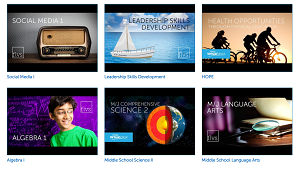Florida Virtual Homeschool Academy Review

Florida Virtual is public school
Florida Virtual is Florida’s Public School Platform. It is available to students living anywhere in the world through Florida Virtual Global.
A number of years ago, the State of Florida invested quite a lot of money in producing an on-line platform that would allow public school students to be homeschooled instead of attending classes live if they so choose. Students who live in Florida can enroll in it free of charge.
The platform itself is very well done, and highly contemporary, and it soon became known world-wide, prompting schools and homeschooling families outside of Florida to want to use the program as well. Because of that, Florida Virtual started their global academy.
Sevenstar is the Christian counter-part
The academy is a public school platform. It is not Christian.
For those seeking a Christian platform, Sevenstar purchased the rights to transform Florida Virtual into a Christian curriculum. Therefore, Sevenstar is the Christian version of Florida Virtual. Teachers at Sevenstar are on staff at Sevenstar, whereas teachers with Florida Virtual are teachers on staff with the Florida school district. See our page on Sevenstar for more information.

Contemporary platform
We have not seen Florida Virtual in action. But we have seen Sevenstar and are very impressed. The platform is contemporary and will appeal to students that are used to bold graphics and interactivity. It would be a good platform, as would Sevenstar, for students who have short attention spans. In between live classes, students are expected to complete assignments that are comprised of short reading passages, videos, written assignments, projects, and discussion posts.
There are live teachers that follow the students. They keep grades and issue report cards. It should be noted that when we read their reviews from “Consumer Affairs”, there were a substantial number of individuals that stated that they had trouble getting Florida Virtual’s teachers to respond in a timely manner. This could be due to the massively increased volume of public schoolers who were suddenly thrust onto the platform due to Covid because all the in-class Florida public schoolers would have had to go online quickly. The review was from that time period. We have not seen any problem of that nature with Sevenstar. They have been extremely fast to address any student issues.
Many classes available but pricing is higher
They have 175 classes available on their platform. They are accredited through Cognia and WASC.
Their pricing is in tiers, with some classes being more expensive than others. Also, they charge by the semester, rather than the year. The prices are: $475 per semester for tier 1 classes, $400 tier 2, and $325 tier 3. Most of their classes are tier 1. We only saw two classes available in tier 3. It should be noted, however, that Sevenstar offers many of the same classes at a much lower price.
They do offer AP classes.
They also have Honors classes, their classes are mobile friendly (meaning you can do them on a mobile phone), and they are NCAA approved.
For more information about Florida Virtual, you can reach their website at: https://www.flvsglobal.net/students-families/.
Our review - here are the facts
Because we have not actually witnessed a student using Florida Virtual, we cannot make a good recommendation one way or the other. But we can tell you the following.
Sevenstar uses the same platform except for the added Christian elements, and it is well done.
Samples that we have seen of Florida Virtual shows it as being a highly contemporary learning platform. It is styled after current trends in education that are scientifically calculated to match brain patterning in today’s youth. What that means is that science has found that the brains of youth today are wired differently than they were a few decades ago, and students are no longer able to have long attention spans. Science has calculated the average attention span for students today, and curriculum developers that follow this science, make learning materials to match the scientific suggestions.
Curriculums that follow this type of learning have a mix of short easy to read passages, videos, games, and assignments. Generally, each is set at a specific time limit to match scientifically calculated average attention spans.
For example. Have you ever listened to a speech or sermon that you really wanted to hear, but after a while your brain just started wandering, and you found yourself missing part of the message because you couldn’t focus on the speaker as attentively as you did at first? It isn’t because you are a “bad” person or because you’re “weak”. It is because the brain is wired to only focus on a speaker for a certain period of time. Today, that time period is shorter than it used to be. And let’s face it. If your mind is wandering, you really aren’t learning as much as you should be. Speakers, and school platforms, that utilize technology designed around this principle only talk for the specified amount of time. Then, they switch to something different, because that switch resets the brain to be able to listen again. That’s how this type of learning platform works. For school it could look like something similar to 15 minutes of reading, a video, a few more minutes of reading, an assignment, a game, etc.
Studies have shown that students actually retain more of the information in a short, interesting burst from a 5-minute video than they do from a boring hour-long video.
I personally can attest to this truth. I attended a community college with the typical style of learning where students read hundreds of pages from a textbook each week and listened to an hour and a half of an instructor speak. My mind wandered so badly that I only really remembered a small part of the material. Then, I went to a university that utilized the type of platform that I talked about above. I learned more in 8 weeks than I did in two years at the community college.
Florida Virtual is not the only academy to use this type of platform. Of course, Sevenstar uses it, and so does Liberty University Academy. Excelsior Classes could be considered as using a similar style simply because the fully live classes tend to accomplish the same feature, but I am not sure if they intentionally use this scientific method or not.
Obviously, we cannot recommend Florida Virtual for families wanting a Christian education. But if the ultimate goal for a family is a public-school education, Florida Virtual is a good fit. We are assuming that since they are public school, they are common core.
We have seen some negative reviews for Florida Virtual from Consumer Affairs, however, in looking at them many of them pertain to students who were in trouble for not doing the work as specified. We did see some regarding teachers not responding in a timely manner. One negative review stated that test questions were not contained in the content. However, there was only one such comment. Overall, there were only a handful of negative reviews, and it should also be acknowledged that most people who write reviews for Consumer Affairs go to the site because they want to report a problem with a business.


